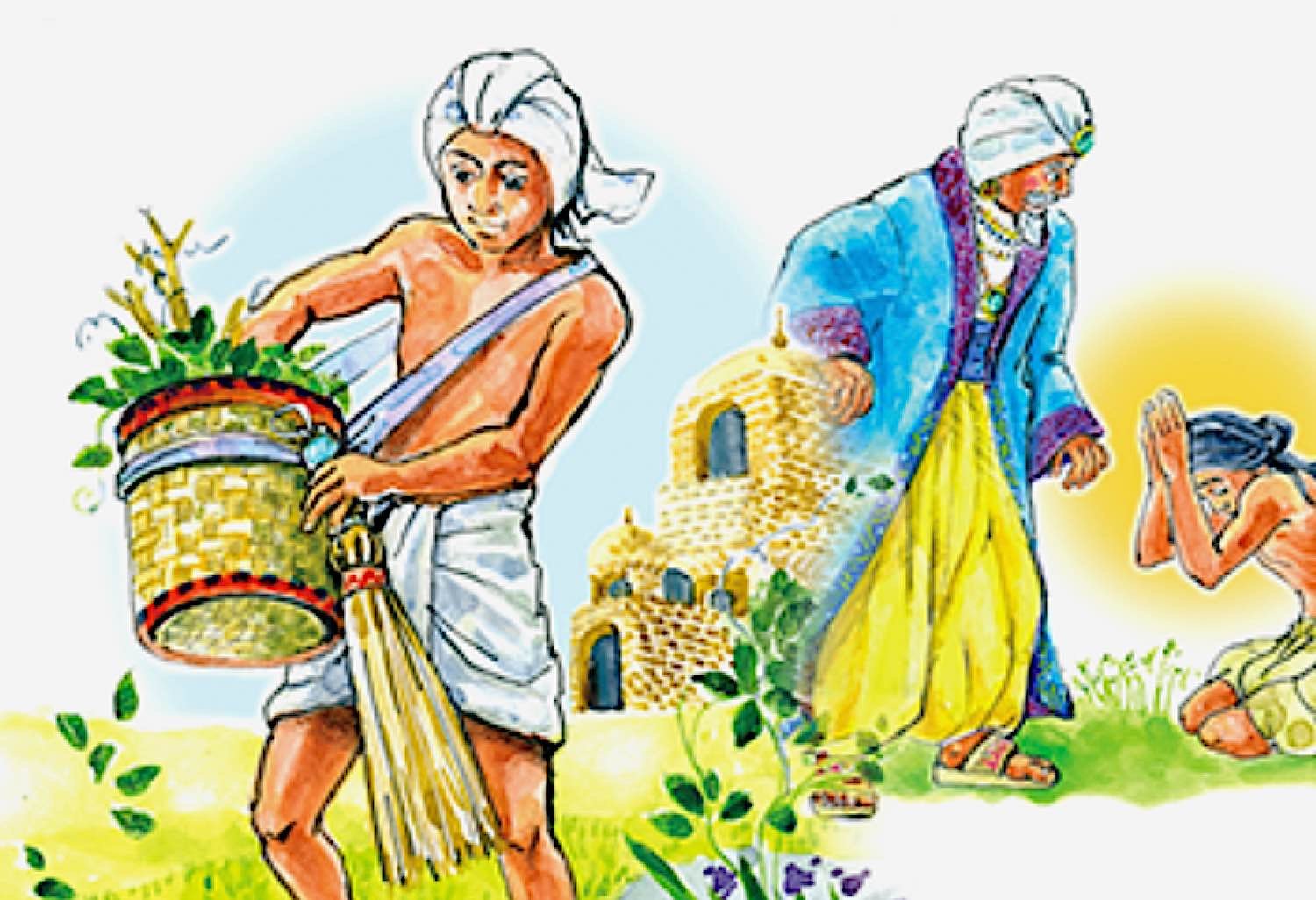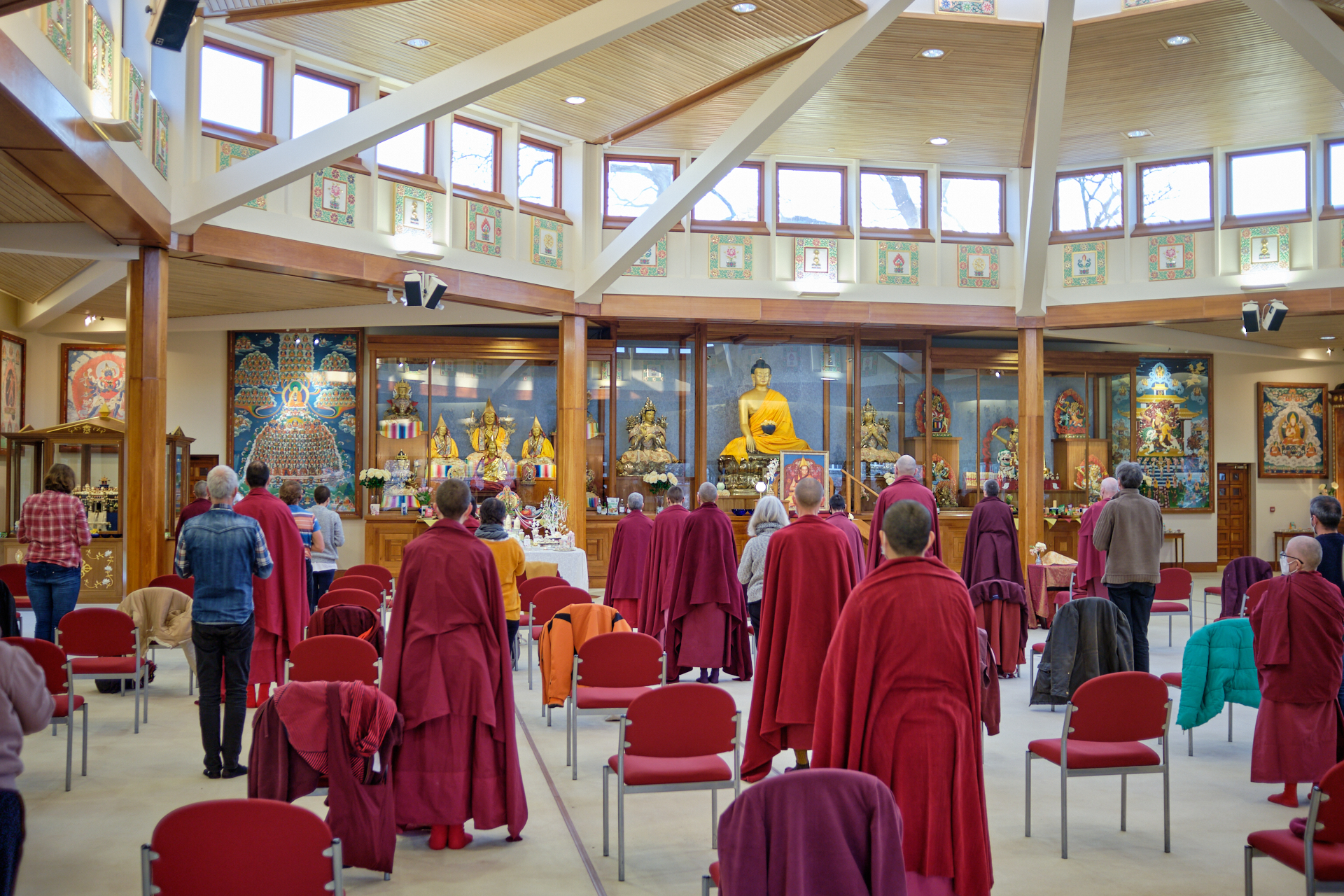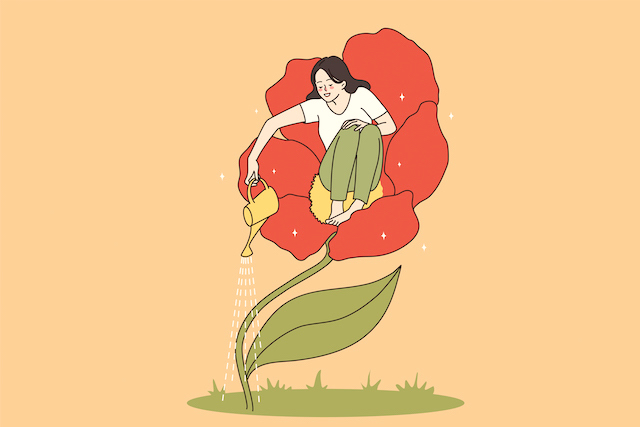Lotus Sutra Chapter 4: Parable of the “Lost Vagabond Son” — second of seven parables: full English translation
“Buddhahood is our inheritance, and the only thing preventing us from claiming that inheritance is ourselves, our own limited view of our ourselves, our low self-esteem, our lack of confidence, our lack of imagination, our sense of inadequacy…” Quote...

“Buddhahood is our inheritance, and the only thing preventing us from claiming that inheritance is ourselves, our own limited view of our ourselves, our low self-esteem, our lack of confidence, our lack of imagination, our sense of inadequacy…”
Quote from Dyomo in a podcast on the meaning of the Parable of the Lost Son.
Editors Note: This is chapter 4 in our ongoing series on the Lotus Sutra, and the second of the seven parables found in the Lotus Sutra. This is the well known parable of the Vagabond Son (representing the aimless disciple) and the patient Father (the Buddha) who disguises himself so he can watch over his unambitious on without him knowing. The parable continues the theme from the Parable of the Burning House in Chapter 3 — found here, if you missed it — where Buddha demonstrates how skillful means are sometimes needed to guide students.
This chapter title synopsizes the gist of the content well: “Belief and Understanding.”
This is an ongoing series, of publishing the beautiful English translations of the Lotus Sutra as guided by Venerable Master Hsuang Hua.
If you missed previous chapters, you’ll find them here:
Chapter 1 of Lotus Sutra 12,000 Monks Gather>> Chapter 2 of Lotus Sutra Essence or Skillful Means>> Chapter 3 of Lotus Sutra, the Burning House>>
A scene from the famous Dunhuang Magao caves painted in the Five Dynasties period. These are scenes from the Lotus Sutra painted around 10th century CE.
Quick Snapshot Synopsis
The Lotus Sutra is famous for its many parables and metaphors. Many of them are so well known that people just “know them” without realizing they represent a specific teaching in the Lotus Sutra. The story of the Vagabond Son and the caring father who uses skillful means to protect his wayward son is one of these.
In this parable, the affluent father represents the Buddha. His wayward son is unambitious and has low self-esteem. He represents the unmotivated student of the Buddha with a limited understanding of Dharma. In the parable, the son becomes a vagabond rather than learning skills from his very successful father. He is so intimidated by his family’s mansion that he escapes becoming a wandering person doing odd jobs for people. The father, who loves and cares for his son, sends two of his retainers, dressed in shabby clothes, to recruit him as a “cleaner” in the mansion. (Since many years have passed and the family has moved, the son doesn’t realize the mansion is his father’s.) The son accepts, believing it is the perfect job for his skills. To meet his son, surreptitiously, the father disguises himself, and gently encourages his son to work hard and learn. For two more decades, the hard-working son toils, gradually proving himself to the father. Finally, when the father is about to pass away, the son learns the truth. All of the family treasure are passed on to the son. Like the father, Buddha teaches students of different capabilities in different ways. The job as a cleaner is a method to help purify the son’s karma. He has always had the heritage as a son, but he had to learn what this meant at his own pace, skillfully guided by the father (Buddha.) In Buddhism, “sons and daughters” of the Buddha doesn’t mean literal sons and daughters; these are his disciples.Importance of Publishing Sutra
Venerable Master Hsuang Hua said,
“We cannot be negligent in doing this work. We must do our best to carry out our real responsibilities. However much we can do, we should do that much. Let’s keep pressing forward and working. We should take Buddhism as our own responsibility. The propagation of the Buddhadharma should be our personal duty in life.”
In that spirit, we are publishing chapter 4 of his amazing translation of the Lotus Sutra. Publishing Sutra is an important way to preserve and spread the Dharma! It is also an important practice. Recitation of Sutra is an excellent Dharma practice for everyone. In Mahayana Sutra, the Lotus Sutra holds a special place for it’s beautiful, lyrical, complete and brilliant teachings.
妙法莲华经
信解品第四
Belief and Understanding – Chapter 4
尔时慧命须菩提、摩诃迦旃延、摩诃迦叶、摩诃目犍连,从佛所、 闻未曾有法,世尊授舍利弗阿耨多罗三藐三菩提记,发稀有心,欢 喜踊跃,即从座起,整衣服,偏袒右肩,右膝著地,一心合掌,屈 躬恭敬,瞻仰尊颜、而白佛言:At that time the wise and long-lived Subhuti, Mahakatyayana, Mahakashyapa, Mahamaudgalyayana, having heard from the Buddha, Dharma such as they had never heard before, the bestowal of the prediction of anuttarasamyaksambodhi upon Shariputra, felt it very rare.
They rose from their seats, jumped for joy, straightened their robes, bared their right shoulders, placed their right knees on the ground, single-mindedly put their palms together, inclined themselves respectfully, gazed at the honored countenance and spoke to the Buddha, saying,
‘我等居僧之首,年并朽迈,自谓已得涅盘,无所堪任,不复进求 阿耨多罗三藐三菩提。
“We, who dwell at the head of the Sangha and are advanced in years, told ourselves that we had already attained Nirvana and had no further responsibility, and we did not go forward to seek anuttarasamyaksambodhi.”
世尊往昔说法既久,我时在座,身体疲懈,但念空、无相、无作, 于菩萨法、游戏神通,净佛国土,成就众生,心不喜乐。
“The World Honored One has, from of old, been speaking the Dharma for a long time. Sitting here all this time, our bodies tired, we have merely been mindful of emptiness, signlessness, and wishlessness, taking no delight in the Bodhisattva Dharmas, in their spiritual penetrations of playfulness, in their purification of Buddhalands, or in their maturation of living beings.”
所以者何。世尊令我等出于三界,得涅盘证,又今我等年已朽迈, 于佛教化菩萨阿耨多罗三藐三菩提、不生一念好乐之心。
“What is the reason? The World Honored One has led us to escape the Three Realms and attain certification to Nirvana. Besides, we are now advanced in years and when the Buddha taught the Bodhisattvas of anuttarasamyaksambodhi we did not give rise to even a single thought of longing for it.”
我等今于佛前、闻授声闻阿耨多罗三藐三菩提记,心甚欢喜,得未 曾有,不谓于今,忽然得闻稀有之法,深自庆幸,获大善利,无量 珍宝、不求自得。’
“Now, in the presence of the Buddha, having heard him bestow upon the Hearers the anuttarasamyaksambodhi prediction, our hearts rejoice enthusiastically and we obtain what we never have had. We never thought that now we would suddenly be able to hear this rare Dharma. We rejoice profoundly, having gained great and good benefit.”
“It is as if, without our seeking them, limitless precious gems had come into our possession.”
‘世尊,我等今者乐说譬喻、以明斯义,
“World Honored One, we would now like to speak a parable to clarify this principle.”
譬若有人,年既幼稚,舍父逃逝,久住他国,或十、二十、至五十 岁,
“It is as if there were a person who, in his youth, left his father and ran away, dwelling long in another country, perhaps ten, twenty or even fifty years.”
年既长大,加复穷困,驰骋四方、以求衣食,渐渐游行,遇向本国 。
“As he grew older, he became poor and needy and ran about in the four directions in search of clothing and food. Gradually he wandered until he accidentally approached his native land.”
“His father, from the first, had set out seeking his son but in vain. He settled midway in a city.
其家大富,财宝无量,金、银、琉璃、珊瑚、琥珀、玻璃、珠、等 ,其诸仓库,悉皆盈溢,多有僮仆、臣佐、吏民,象马、车乘、牛 羊、无数,出入息利,乃遍他国,商估贾客、亦甚众多。
His household was one of great wealth, with limitless wealth and jewels, gold, silver, lapis lazuli, coral, amber, crystal, pearls, and other jewels. His granaries and treasuries were overflowing, and he had many servants, ministers and assistants, as well as countless elephants, horses, carriages, cattle, and sheep. The profits from his trade extended to the other countries, and there were also many traders and merchants.”
“Then the poor son, having wandered through various villages and passed through countries and cities, at last reached the city where his father had settled.”
父母念子,与子离别五十余年,而未曾向人说如此事,但自思惟, 心怀悔恨,自念老朽,多有财物,金银、珍宝,仓库盈溢,无有子 息,一旦终没,财物散失,无所委付,是以殷勤、每忆其子。复作 是念:“ 我若得子、委付财物,坦然快乐,无复忧虑。”’
“The father had always been mindful of his son. Although they had been separated for over fifty years, he had never spoken of the matter to anyone, but merely pondered over it, his heart filled with regret, as he thought,
‘I am old and decrepit. I have much wealth: gold, silver, and precious gems, granaries and storehouses filled to overflowing. Such a pity that I have no son! One day I’m bound to die, and when I do, my wealth will be scattered and lost, for I have no one to bequeath them to.’ This is why he ever earnestly thought of his son. ‘If I could only get my son back, I’d make him heir to my wealth. I’d be contented and happy and have no further worries.’”
‘世尊,尔时穷子、佣赁展转、遇到父舍,住立门侧。 遥见其父、踞师子床,宝几承足,诸婆罗门、刹利、居士、皆恭敬 围绕,以真珠璎珞、价值千万,庄严其身,吏民、僮仆,手执白拂 ,侍立左右。
“World Honored One, the poor son then, hiring himself as a laborer here and there, unexpectedly arrived at his father’s house.
Standing by the gate, he saw his father seated on a Lion-seat. His feet were resting on a jeweled footstool, and he was reverently surrounded by Brahmans, Kshatriyas, and laypeople. Necklaces of pearls, their value in the millions, adorned his body.
覆以宝帐,垂诸华幡,香水洒地,散众名华,罗列宝物,出内取与 ,有如是等种种严饰,威德特尊。 穷子见父有大力势,即怀恐怖,悔来至此。
Attendants and servants, holding white whisks, waited on him right and left. Above him was a jeweled canopy hung with flowers and pennants. Fragrant water was sprinkled on the ground, and expensive flowers were scattered about. Precious objects were placed in rows, which were passed out and taken in on leaving and entering. Such were the adornments, and the majesty and authority of his awesome virtue. When the poor son saw his father, possessed of such great power, he was immediately afraid and regretted having come there.
窃作是念:“此或是王、或是王等,非我佣力得物之处,不如往至 贫里,肆力有地,衣食易得,若久住此,或见逼迫,强使我作。” 作是念已,疾走而去。’
Secretly he thought, ‘This is perhaps a king, or one equal to a king. This is no place for me to hire myself out. I’d better go to a poor village where there will be room for me to work and where I can easily obtain clothing and food. If I stay here any longer, I may be forced to work.’ And with this thought, he quickly ran off.”
‘时富长者于师子座,见子便识,心大欢喜。即作是念: “Then the wealthy elder, seated on the Lion-seat, seeing his son, recognized him and his heart rejoiced greatly, as he thought,
“我财物库藏、今有所付,我常思念此子,无由见之,而忽自来, 甚适我愿,我虽年朽,犹故贪惜。”
‘I now have someone to whom I can bequeath my wealth and treasuries. I have constantly been mindful of my son, but had no way of seeing him. Then, all of a sudden, he came on his own, and my wish has been fulfilled. Although I am old and decrepit I still longed for him with regret.’”
“He then sent attendants to follow him and bring him back. Thereupon, the servants quickly apprehended him.
穷子惊愕,称怨、大唤:“我不相犯,何为见捉?”使者执之愈急, 强牵将还。
The poor son in alarm shouted in resentment, “I have committed no offense. Why have I been seized?” The servants, with even greater haste, grabbed him and dragged him back.
于时穷子,自念无罪,而被囚执,此必定死,转更惶怖,闷绝躄地 。
The poor son thought to himself. ‘I am blameless and yet have been imprisoned. This surely means that I will die,’ and, even more frightened, he fainted and fell to the ground.”
父遥见之,而语使言:“不需此人,勿强将来,以冷水洒面,令得 醒悟,莫复与语。”
“The father saw his son from afar and said to the servant, “I do not need this person. Do not force him to come along. Sprinkle cold water on his face to bring him to, but do not speak further with him”
所以者何。父知其子、志意下劣,自知豪贵、为子所难,审知是子 ,而以方便,不语他人、云是我子。
Why was this? The father knew that his son’s resolve and will were inferior and lowly, and that his own nobility was a source of difficulty to his son. Therefore, although he was certain that this was his son, he expediently refrained from telling anyone, “This is my son.”
使者语之:“我今放汝,随意所趋。”
The servant said to the son, “I now set you free. You may go wherever you wish.”
穷子欢喜、得未曾有,从地而起,往至贫里、以求衣食。’
The poor son was delighted, having gained what he had never had before. He rose from the ground and went to a poor village to seek clothing and food.”
‘尔时长者将欲诱引其子、而设方便,密遣二人、形色憔悴、无威 德者:
“Then the elder, wishing to induce his son, set up an expedient and secretly sent two people, haggard and undignified in appearance, saying to them,
“汝可诣彼,徐语穷子,此有作处,倍与汝值。穷子若许,将来、 使作。若言、欲何所作,便可语之,雇汝除粪,我等二人、亦共汝 作。”
“You may go there and gently speak to that poor one. Tell him there is a place for him to work here where he can earn twice as much. If he agrees, bring him back and put him to work. If he asks what he is to do, tell him, ‘You are being hired to sweep out dung. We two will work along with you.’”
“Then the two servants sought out the poor son, and when they found him, they told him the above matter in detail.”
尔时穷子先取其价,寻与除粪。其父见子,愍而怪之。“At that time the poor son first took his salary and then joined them in sweeping away the dung. When the father saw his son, he felt pity and amazement.”
又以他日,于窗牖中、遥见子身,羸瘦憔悴,粪土尘坌,污秽不净 。
“Later, on another day, through a window, he saw his son at a distance, thin, haggard, soiled with dung, dirt, and filth.”
“He then removed his necklace of beads, his soft upper garments, and his adornments and put on a coarse, worn out, and filthy robe, smeared himself with dirt and holding a dung shovel, looking frightful he addressed his workers, saying,
“All of you, work hard! Do not be lax.” By this device he draws near to his son, to whom he later says, “Hey, my boy! You should stay here and work. Don’t go elsewhere. I will increase your wages.
诸有所需、盆器米面、盐醋之属,莫自疑难,亦有老敝使人、需者 相给,好自安意,我如汝父,勿复忧虑。
Whatever you need, be it pots, utensils, rice, flour, salt or vinegar or other such things, don’t trouble yourself about it. I also have an old, worn-out servant you can have if you need him. So put your mind at rest. I am like your father, so have no more worries. 所以者何。我年老大,而汝少壮,汝常作时,无有欺怠、嗔恨怨言 ,都不见汝有此诸恶、如余作人,自今已后,如所生子。”
Why? I am very old, and you are young and strong. Whenever you are working, you are never deceitful, remiss, angry, hateful, or grumbling. I have never seen you commit such evils as I have other workers. From now on you shall be just like my own son.”
即时长者、更与作字,名之为儿。尔时穷子、虽欣此遇,犹故自谓 、客作贱人。
“Just then the elder gave him a name, calling him his son. The poor son, although delighted at this happening, still referred to himself as a lowly worker from outside.
For this reason, for twenty years he was constantly kept at work sweeping away dung.”
过是已后,心相体信,入出无难,然其所止、犹在本处。’ “After this, they trusted one another, and he came and went without difficulty. However, he still stayed in the same place as before.”
‘世尊,尔时长者有疾,自知将死不久。
“World Honored One: At that time, the elder grew sick and knew he would die before long.
语穷子言:“我今多有金银珍宝,仓库盈溢,其中多少、所应取与 ,汝悉知之,我心如是,当体此意。所以者何。
He said to the poor son, “I now possess much gold, silver, and jewels, and my granaries and storehouses are filled to overflowing. You should know in detail their quantities and the amounts to be received and given. Such are my thoughts, and you should understand what I mean. What is the reason? 今我与汝,便为不异,宜加用心,无令漏失。”
You and I are now no different. You should be even more careful that nothing be lost.”
尔时穷子,即受教敕,领知众物、金银珍宝、及诸库藏,而无希取 一餐之意,然其所止,故在本处,下劣之心、亦未能舍。
“At that time, the poor son, having received these instructions, took charge of all the goods, the gold, silver, and precious gems, as well as the granaries and storehouses, and yet he did not long for so much as a single meal. He continued to stay in the same place, still unable to let go of his lowly thoughts.”
“After a short while, the father knew that his son had grown more relaxed, that he had accomplished the great resolve and despised his former state of mind.
临欲终时、而命其子、并会亲、族、国王、大臣、刹利、居士,皆 悉已集,即自宣言:
Knowing that his own end was near, he ordered his son to gather together all the relatives, kings, great ministers, Kshatriyas, and lay people. When they had all assembled, he spoke to them saying,
“诸君当知,此是我子,我之所生,于某城中、舍吾逃走,伶俜辛 苦、五十余年,其本字某,我名某甲,昔在本城、怀忧推觅,忽于 此间、遇会得之,此实我子,我实其父,今我所有一切财物,皆是 子有,先所出内,是子所知。
“All of you gentlemen should know that this is my son, begotten by me. In a certain city, he left me and ran away to suffer desolation, poverty, and hardship for over fifty years. His original name was such and such, and my name was such. Long ago, in my native city, I anxiously sought him. Suddenly, here, I have found him again! This is really my son. I am really his father. All of my wealth now belongs to my son, and all that has been paid out and taken in is known by him.”
世尊,是时穷子闻父此言,即大欢喜、得未曾有,而作是念,我本 无心、有所希求,今此宝藏自然而至。”’
“World Honored One, when the poor son heard what his father had said, he rejoiced greatly, having obtained what he had never had, and he thought, ‘Originally, I had no thought to seek anything, and now this treasury has come to me of itself.’”
‘世尊,大富长者、则是如来,我等皆似佛子,如来常说、我等为 子。
“World Honored One, the great and wealthy elder is the Thus Come One. We are all like the Buddha’s sons.”
“The Thus Come One always says that we are his sons.”
世尊,我等以三苦故,于生死中、受诸热恼,迷惑无知,乐著小法 。
“World Honored One, because of the three kinds of suffering, we have suffered much torment in the midst of births and deaths. Deluded and ignorant, we clung to petty dharmas.”
今日世尊,令我等思惟捐除诸法戏论之粪,我等于中勤加精进,得 至涅盘一日之价,既得此已,心大欢喜,自以为足,便自谓言:“ 于佛法中勤精进故,所得宏多。”
“Today, the World Honored One has caused us to think about getting rid of the dung of frivolous discussions of the Dharma. We increased our vigor to earn one day’s wage of Nirvana. Having attained this, our hearts rejoiced greatly, and we were content, saying to ourselves that, through our diligence and vigor, what we had gained in the Buddhadharma was plentiful.”
然世尊先知我等心著敝欲,乐于小法,便见纵舍,不为分别、汝等 当有如来知见宝藏之分。
“However, the World Honored One, knowing all along that our minds were attached to lowly desires and took delight in petty dharmas, let us go our own way and did not specify to us saying, ‘You are all to have a share in the treasury of the Thus Come One’s knowledge and vision.’”
“The World Honored One, using the power of expedient devices, has spoken of the Thus Come One’s wisdom. Having gained from the Buddha the one day’s wage of Nirvana, we took it to be a great attainment; we had no ambition to seek the Great Vehicle. Besides, the wisdom of the Thus Come One had been set forth for the sake of the Bodhisattvas, and so we held no expectations regarding it. What is the reason?
佛知我等心乐小法,以方便力、随我等说,而我等不知真是佛子。The Buddha knew that our minds took delight in petty dharmas. He used the power of expedients to teach us in the appropriate manner, and we did not know that we were truly the Buddha’s sons.”
今我等方知世尊于佛智慧、无所吝惜。所以者何。“Now we know that the World Honored One is by no means ungenerous with the Buddha’s wisdom. Why?
我等昔来真是佛子,而但乐小法,若我等有乐大之心,佛则为我说 大乘法。
From of old, we truly have been the Buddha’s sons, and yet we delighted only in petty dharmas. If we had thought to delight in the great, the Buddha would then have spoken for us the Great Vehicle Dharma.
于此经中、唯说一乘,而昔于菩萨前、毁呰声闻乐小法者,然佛实 以大乘教化,是故我等说、本无心有所希求。 今法王大宝自然而至,如佛子所应得者、皆已得之。’ This Sutra speaks of only One Vehicle. In the past, in the presence of the Bodhisattvas, the Buddha had belittled the Hearers who delight in lesser dharmas, but he was actually employing the Great Vehicle in teaching and transforming them.”
“Therefore, we say that originally we had not hoped for or sought anything, and yet now these great jewels of the Dharma King have come to us of themselves. That which the Buddha’s sons should attain, we have already attained.”
尔时摩诃迦叶欲重宣此义,而说偈言:At that time, Mahakashyapa, wishing to restate this meaning, spoke verses, saying,
我等今日、 闻佛音教, 欢喜踊跃, 得未曾有。
“We, on this day,
Hearing the sound of the Buddha’s teaching, Jump for joy!
Gaining what we never had.
佛说声闻, 当得作佛, 无上宝聚, 不求自得。
The Buddha says that Hearers,
Shall become Buddhas in the future. A cluster of supreme gems,
We have gained, without our seeking.
譬如童子, 幼稚无识, 舍父逃逝, 远到他土, 周流诸国、 五十余年。
It is like a youth,
Who, young and ignorant,
Ran away from his father
To another distant land,
Roaming from country to country For fifty years and more.
其父忧念, 四方推求, 求之既疲, 顿止一城,
His father, worried about him, Sought him in the four directions Until, tired of the search,
He stopped in a certain city,
造立舍宅, 五欲自娱。
Where he built himself a house
And amused himself with the five desires.
其家巨富, 多诸金银、 砗磲玛瑙、 真珠琉璃、
His household was large and wealthy, With much gold and silver, Mother-of-pearl, carnelian,
Real pearls, and lapis lazuli,
象马牛羊、 辇舆车乘、 田业僮仆, 人民众多,
Elephants, horses, cattle, and sheep, Hand-drawn carts, palanquins, and chariots, Husbandmen and servants,
And a multitude of subjects.
出入息利、 乃遍他国,
The profits from his trade Extended to the other countries.
商估贾人、 无处不有, 千万亿众、 围绕恭敬,
Traders and merchants
Were present everywhere.
Multitudes in the hundreds of millions Surrounded him reverently.
常为王者 之所爱念, 群臣豪族, 皆共宗重。
And always, by kings,
He was cherished and remembered. The ministers and noble clans
All honored him.
以诸缘故, 往来者众, 豪富如是, 有大力势。
For those reasons,
Those who came and went were many. Such was his nobility, wealth,
And his great authority.
而年朽迈, 益忧念子, 夙夜惟念, 死时将至,
But then, as he grew old and decrepit,
He was filled with worry for his son. Morning and evening, his only thought was, “My time of death is drawing near.
痴子舍我, 五十余年, 库藏诸物、 当如之何。
My foolish son has left me now,
For over fifty years.
The things in my granaries and store-houses, Whatever shall I do with them?
尔时穷子, 求索衣食, 从邑至邑、 从国至国,
Then the poor son, Seeking clothing and food, Went from city to city, From country to country,
或有所得, 或无所得,
Sometimes getting something, Sometimes getting nothing.
饥饿羸瘦, 体生疮癣, 渐次经历, 到父住城,
Starving, emaciated,
Covered with scabs,
He went on his way until eventually,
He arrived in the city where his father lived.
佣赁展转, 遂至父舍。 尔时长者, 于其门内、
Hiring himself out along the way,
He finally reached his father’s house. At that time, the elder,
Within his gateway,
施大宝帐, 处师子座, 眷属围绕, 诸人侍卫,
Was covered by a large canopy, And seated on a Lion-throne, Surrounded by his retinue,
And various attendants.
或有计算, 金银宝物, 出内财产, 注记券疏。
Some of them were counting up His gold, silver, and other valuables. His income and expenses were Recorded there on ledgers.
穷子见父 豪贵尊严, 谓是国王、 若国王等,
When the poor son saw his father, Of such nobility and wealth,
He said, “This must be a king,
Or the equal of a king.”
惊怖自怪, 何故至此。 覆自念言, 我若久住,
In fright, he reproved himself, “Why have I come here?”
And further to himself, he said, “If I stay here long,
或见逼迫, 强驱使作。 思惟是已, 驰走而去,
I may be oppressed
And forced to go to work.” Having had this thought, He hurriedly ran off
借问贫里, 欲往佣作。
To a poor village, asking To be hired to work.
长者是时、 在师子座, 遥见其子, 默而识之,
Just then, the elder,
Seated on the lion-throne, Saw his son at a distance, And silently recognized him.
即敕使者、 追捉将来。 穷子惊唤, 迷闷躄地, He then commanded his attendants
To seize him and bring him back.
The poor son cried out in alarm,
And fainted, falling to the ground.
是人执我, 必当见杀, 何用衣食、 使我至此。
“These people have caught me!
I shall certainly be killed!
Why, for food and clothing’s sake Did I come to this place?”
长者知子, 愚痴狭劣, 不信我言, 不信是父。
The elder knew that his son
Was foolish and lowly.
“He wouldn’t believe me if I told him He wouldn’t believe that I am his father.
即以方便, 更遣余人, 眇目矬陋、 无威德者,
Then he used an expedient, And sent some other men, One-eyed, squat, and ugly, Lacking awesome virtue.
汝可语之, 云当相雇, 除诸粪秽, 倍与汝价。
“Speak to him,” he said,
“And tell him, ‘You will work with us Getting rid of dung and filth
At twice your normal wages.”
穷子闻之, 欢喜随来, 为除粪秽, 净诸房舍。
When the poor son heard this, He happily followed them back And swept out the dung and filth, Cleaning all the dwellings.
长者于牖、 常见其子, 念子愚劣, 乐为鄙事。
From his window, the elder
Would often watch his son,
Remembering that he was foolish and lowly And enjoyed menial work.
于是长者 著敝垢衣, 执除粪器, 往到子所,
Then the elder
Put on a worn and dirty robe, And, holding a dung shovel, Went to where his son was.
方便附近, 语令勤作。 既益汝价, 并涂足油,
Expediently drawing near to him, He said, “Work with diligence,
For I have increased your wages, And shall give you oil for your feet,
饮食充足, 荐席厚暖, 如是苦言、 汝当勤作,
And your fill of food and drink, And thick, warm bedding.” Thus he spoke sharply saying, “You must work hard!”
又以软语、 若如我子。
And then in gentler tones, he added, “You are like my own son.
长者有智, 渐令入出, 经二十年, 执作家事,
The elder, in his wisdom,
Eventually allowed him to come and go.
For a period of twenty years,
He was put in charge of household business.
示其金银、 真珠玻璃、 诸物出入, 皆使令知。
He showed him his gold, silver,
Real pearls and crystal.
The income and expense of all these things, He was caused to know.
犹处门外, 止宿草庵, 自念贫事, 我无此物。
And yet the son still lived outside the gate, Dwelling in a grass hut
Thinking of his poverty:
“None of these things are mine.
父知子心, 渐已广大, 欲与财物, 即聚亲族、 国王大臣、 刹利居士。
The father knew his son’s mind
Gradually had expanded,
And wishing to give him wealth, He gathered together his relatives, The kings, and great ministers, The Kshatriyas and lay people.
于此大众, 说是我子, 舍我他行、 经五十岁,
In the midst of this great assembly , He said, “This is my son.
He left me and went away
Fifty years ago.
自见子来、 已二十年, 昔于某城, 而失是子,
And it has been twenty years Since I saw him return.
Long ago in a certain city
I lost my son.
周行求索, 遂来至此。 凡我所有、 舍宅人民, 悉以付之, 恣其所用。
Searching for him everywhere,
I came to this place.
Everything that I own,
My houses and servants,
I bequeath it all to him
That he may use it as he pleases
子念昔贫, 志意下劣, 今于父所、 大获珍宝,
The son, recalling his former poverty And his lowly intentions.
Who now, in his father’s presence Had obtained these precious jewels,
并及舍宅、 一切财物, 甚大欢喜, 得未曾有。
And these dwelling places,
And all such wealth,
Greatly rejoiced,
Having gained what he’d never had.
佛亦如是, 知我乐小, 未曾说言, 汝等作佛,
The Buddha in the same way Knew our fondness for the petty. And so he never said to us,
“You shall become Buddhas.”
而说我等, 得诸无漏, 成就小乘、 声闻弟子。
Instead he said that we
Could attain cessation of all outflows, Realize the lesser vehicle,
And become Hearer Disciples.
佛敕我等, 说最上道, 修习此者, 当得成佛。
The Buddha has instructed us
To speak of the unsurpassed Path,
And spoken of those who practice it
As being able to accomplish Buddhahood.
我承佛教,为大菩萨, 以诸因缘、种种譬喻、 若干言辞、说无上道。
Receiving the Buddha’s teaching, we
For the sake of the Great Bodhisattvas,
Use causes and conditions, Various analogies,
And numerous expressions
To speak of the unsurpassed Path.
诸佛子等、 从我闻法, 日夜思惟, 精勤修习。
All the Buddha’s disciples,
Having heard from us this Dharma, Think upon it day and night,
And diligently practice it.
是时诸佛, 即授其记, 汝于来世、 当得作佛, 一切诸佛, 秘藏之法,
Thereupon, all the Buddhas,
Then bestow predictions upon them,
Saying, “You, in future age,
Shall become Buddhas.”
This is the secret store of Dharma, Of all the Buddhas.
但为菩萨, 演其实事,而不为我, 说斯真要。
Only for the Bodhisattvas
Are such real matters set forth.
And not for our sakes
Have such true essentials been spoken.
如彼穷子、得近其父, 虽知诸物,心不希取。
Just as the poor son.
Drew near his father, and
Although he knew of all his possessions,
In his heart he held no hope of getting them,
我等虽说, 佛法宝藏,自无志愿, 亦复如是。
In just the same way,
Even though we have spoken
Of the Buddhadharma’s precious store, We personally never aspired to it.
Having attained inner-extinction, We thought this sufficient,
For having completed this,
There was nothing else to be done.
我等若闻,净佛国土, 教化众生,都无欣乐。
And even if we had heard
Of purifying Buddhalands,
And teaching and transforming living beings, We’d have taken no delight therein.
所以者何,一切诸法, 皆悉空寂,无生无灭, 无大无小,无漏无为,
And for what reason?
All dharmas are
Completely empty and still,
Neither produced nor destroyed, Neither great nor small,
Without outflows and unconditioned.
如是思惟,不生喜乐。 我等长夜,于佛智慧,
Reflecting in this way,
We did not give rise to joy. During the long night,
We had no craving or attachment
无贪无著, 无复志愿, 而自于法、 谓是究竟。
For the Buddha’s wisdom, Nor did we aspire to it,
Yet, as to Dharma, we Claimed we had the ultimate.
我等长夜、 修习空法, 得脱三界, 苦恼之患, 住最后身、 有余涅盘。
All through the long night,
We practiced and cultivated the Dharma of emptiness. Having won release from the triple world
With its suffering, distress and calamities, We dwell within our final bodies,
In nirvana with residue.
佛所教化, 得道不虚, 则为已得, 报佛之恩。
According to the Buddha’s teaching, We attained the Way which is not false, And we assumed that we had
Thereby repaid the Buddha’s kindness.
我等虽为,诸佛子等, 说菩萨法、以求佛道, 而于是法、永无愿乐。
Although we, for the sake
Of the Buddha’s disciples spoke
Of the Bodhisattvas Dharma,
With which they should seek Buddhahood, Still in this Dharma,
We never took delight at all.
导师见舍, 观我心故, 初不劝进、 说有实利。
Our master saw this and let things be, Because he saw into our hearts,
And so, at first, he did not encourage us By telling of the real advantage.
如富长者, 知子志劣, 以方便力、 柔伏其心,
Just as the wealthy elder
Understand the son’s low esteem
Used the power of expedients To bring his mind under control,
然后乃付,一切财物。 佛亦如是、 现稀有事
And afterwards gave to him All of his valuables,
The Buddha in the same way Manifests rare things,
知乐小者, 以方便力、 调伏其心, 乃教大智。
But for those who delight in the small, He uses the power of expedients
To brings their minds under control, Only then teaching the greater wisdom
我等今日、 得未曾有, 非先所望, 而今自得,
On this day, we
Have gained what we never had! That for which we lacked hope, We now have attained.
如彼穷子,得无量宝。 世尊我今,得道得果, 于无漏法、得清净眼。
Just as the poor son
Gained limitless treasure,
O World Honored One, now
We’ve obtained the Path and its fruits. Within the non-outflow Dharma We’ve gained the eye, pure and clear.
我等长夜、 持佛净戒, 始于今日, 得其果报,
During the long night, we
Maintained the Buddha’s pure morality But only on this day,
Have we gained this reward.
法王法中、 久修梵行, 今得无漏、 无上大果。
In the Dharma Kings’s Dharma,
Long have we cultivated Brahman conduct. Now we’ve obtained that non-outflow, The unsurpassed, great fruition.
我等今者、 真是声闻, 以佛道声、 令一切闻。
Now we are all
Truly Hearers.
And taking the sound of the Buddha’s Way, We cause all to hear it.
我等今者、 真阿罗汉,于诸世间、 天人魔梵, 普于其中、 应受供养。
Now we are all
Truly Arhats,
And in all the world,
With its gods, people, maras and Brahmas, Everywhere among them
We are worthy of receiving offerings.
世尊大恩, 以稀有事, 怜愍教化、 利益我等,
The World Honored One in his great kindness, Uses this rare thing,
To pity, teach.
And benefit us,
无量亿劫、 谁能报者。
Throughout limitless millions of eons. Who could repay him?
手足供给, 头顶礼敬, 一切供养, 皆不能报。
Giving one’s hands and feet, Bowing reverently in obeisance, Whatever offering one makes, Never repays him.
若以顶戴, 两肩荷负, 于恒沙劫、 尽心恭敬,
If one bore him on one’s head,
Or carried him upon one’s shoulders,
For aeons as numerous as the Ganges’ sands, Exhausting one’s mind in reverence-
又以美膳、无量宝衣、 及诸卧具、种种汤药,
Or further, if one used delicacies, And limitless valuable clothing, And all types of bedding,
And various medicines,
牛头栴檀、 及诸珍宝、 以起塔庙, 宝衣布地, Ox-head sandalwood,
And various precious gems,
Or stupas and temples
Covering the ground with valuable cloth,
如斯等事, 以用供养, 于恒沙劫, 亦不能报。
And if with such things as these,
One made offerings
Throughout aeons as numerous as the Ganges’ sands, One still never repays him.
诸佛稀有、无量无边、 不可思议、大神通力,
The Buddhas are rare indeed. Limitless and boundless,
Yes, inconceivable is the power,
Of their great spiritual penetrations.
无漏无为,诸法之王, 能为下劣、忍于斯事, 取相凡夫,随宜为说。
Without outflows, unconditioned,
They are kings of all the Dharmas.
For the sake of lesser beings,
They bear up under this work.
To common folks who grasp at mark, They teach what is appropriate.
诸佛于法, 得最自在, 知诸众生, 种种欲乐、
The Buddhas have, within the Dharmas, Attained to the highest comfort.
They understand all living beings’ Various desires and delights,
及其志力, 随所堪任, 以无量喻、 而为说法,
As well as the strength of their resolve, According to what they can bear, Using limitless analogies,
They teach them the Dharma,
随诸众生, 宿世善根,
In accord with living beings’ Wholesome roots from former lives.
又知成熟、 未成熟者, 种种筹量, 分别知已, 于一乘道、 随宜说三。
And knowing those who have matured,
And those who have not yet matured,
Through such calculations,
They discriminate and understand, And in the pathway of One Vehicle, They appropriately speak of three.

 Tfoso
Tfoso 































